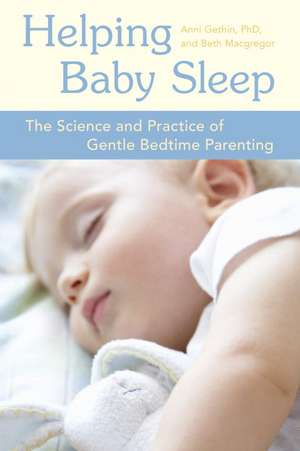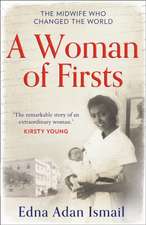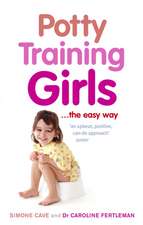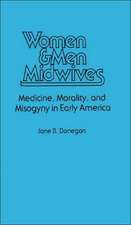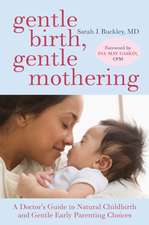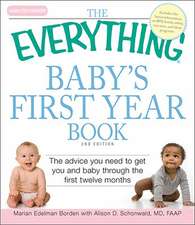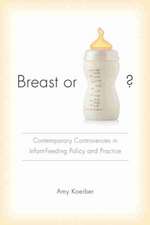Helping Baby Sleep: The Science and Practice of Gentle Bedtime Parenting
Autor Anni Gethin, Beth MacGregoren Limba Engleză Paperback – 30 iun 2009
• Learn why babies wake at night and need help to settle
• Understand how early parenting choices affect a baby’s growing brain
• Examine why “sleep training” is risky, both in the short and long terms
• Discover how to create an effective sleep routine and safe sleeping environment
• Explore common baby sleep problems and how to cope with them
• Find out how tired moms and dads can build a support system (and stay sane)
Sensitive, responsive parenting establishes a powerful bond between baby and parent--a connection that lays the foundation for healthy emotional and psychological development. Filled with scientific evidence, stories from parents, and testaments from infant mental health authorities, Helping Baby Sleep gives conscientious moms and dads the insight and practical tools to help their babies thrive.
“Helping Baby Sleep offers tired parents fresh ideas about how to deeply connect with their infant or toddler to support the transition from wakefulness to sleep. The book is filled with beautifully translated, science-based concepts that are made accessible to parents of all backgrounds. The authors have done a masterful job of elucidating the importance of relationships in shaping the brain. Enjoy and sleep well!”
--Daniel J. Siegel, MD, author of Mindsight: The New Science of Personal Transformation, and coauthor of Parenting from the Inside Out
“Gethin and Macgregor have boldly and successfully waded into the complex issues of infant sleep, creating a guide that gives parents hope and support. A magnificent gift to mothers and fathers--superb.”
--Michael Trout, MA, director of the Infant-Parent Instit
Preț: 99.82 lei
Nou
Puncte Express: 150
Preț estimativ în valută:
19.10€ • 19.100$ • 15.80£
19.10€ • 19.100$ • 15.80£
Carte disponibilă
Livrare economică 17-31 martie
Preluare comenzi: 021 569.72.76
Specificații
ISBN-13: 9781587613401
ISBN-10: 1587613409
Pagini: 205
Dimensiuni: 152 x 230 x 13 mm
Greutate: 0.3 kg
Editura: CELESTIAL ARTS
ISBN-10: 1587613409
Pagini: 205
Dimensiuni: 152 x 230 x 13 mm
Greutate: 0.3 kg
Editura: CELESTIAL ARTS
Notă biografică
ANNI GETHIN, PhD, is a health social scientist who runs a research and planning consultancy, lectures in public health and social science, and is a mother of three boys. BETH MACGREGOR is a psychologist who trains health and welfare workers in infant mental health, child development, and child protection. She has two sons. Both authors live in Sydney, Australia.
THE AUTHOR SCOOP
Have any good pet stories?
I have disgusting pet stories. Never leave a dog and a full potty in the same room.
What's been sitting in the back of your fridge for more than a year?
I still have my youngest son’s placenta in my freezer– he is turning 9. And for several years we had an enormous funnel web spider (Australia’s most deadly spider) frozen in water – until we shifted house and some friends babysat our frozen items.
Favorite childhood book?
Farmer Boy by Laura Ingalls Wilder. I read it so much it fell apart.
Name the most horrifying dish that your mother used to make.
She was a classic 70s cook (though has modernized greatly since). It is a toss up between a kind of sloppy steak and kidney number and a very grey savory mince.
What did you want to be when you grew up?
My first stated ambition was to be ‘a petrol (gas) station man’, followed later by a strong desire to be a zoologist or paleontologist. I don’t think any kid dreams of being a social scientist.
THE AUTHOR SCOOPWhat is your favorite thing about being an author?
Feedback from readers that our book has made a difference to their lives. I love knowing that there are children and parents who are living happier lives as a result of reading our book.
Favorite dessert?
Sticky date pudding with King Island cream!
Favorite childhood book?
Enid Blyton’s ‘Famous Five’ books.
How do you cheer yourself up when you're feeling down?
I actively practice being grateful for all the good things in my life - even for things as simple as having eyes to see and legs to walk. I find gratitude to be the perfect antidote to unhappiness.
What's the best way to spend a rainy Saturday morning?
Playing in bed with my kids and my husband.
If you had to boil the message of Helping Your Baby to Sleep down to one sentence, what would it be?
Your baby needs you.
THE AUTHOR SCOOP
Have any good pet stories?
I have disgusting pet stories. Never leave a dog and a full potty in the same room.
What's been sitting in the back of your fridge for more than a year?
I still have my youngest son’s placenta in my freezer– he is turning 9. And for several years we had an enormous funnel web spider (Australia’s most deadly spider) frozen in water – until we shifted house and some friends babysat our frozen items.
Favorite childhood book?
Farmer Boy by Laura Ingalls Wilder. I read it so much it fell apart.
Name the most horrifying dish that your mother used to make.
She was a classic 70s cook (though has modernized greatly since). It is a toss up between a kind of sloppy steak and kidney number and a very grey savory mince.
What did you want to be when you grew up?
My first stated ambition was to be ‘a petrol (gas) station man’, followed later by a strong desire to be a zoologist or paleontologist. I don’t think any kid dreams of being a social scientist.
THE AUTHOR SCOOPWhat is your favorite thing about being an author?
Feedback from readers that our book has made a difference to their lives. I love knowing that there are children and parents who are living happier lives as a result of reading our book.
Favorite dessert?
Sticky date pudding with King Island cream!
Favorite childhood book?
Enid Blyton’s ‘Famous Five’ books.
How do you cheer yourself up when you're feeling down?
I actively practice being grateful for all the good things in my life - even for things as simple as having eyes to see and legs to walk. I find gratitude to be the perfect antidote to unhappiness.
What's the best way to spend a rainy Saturday morning?
Playing in bed with my kids and my husband.
If you had to boil the message of Helping Your Baby to Sleep down to one sentence, what would it be?
Your baby needs you.
Extras
Introduction: Hear the Babies Crying
This book is about responsive parenting. It is about how babies thrive when parents are sensitive to their needs--during the day and the night. It looks at baby sleep and shows that babies wake up at night and need help to settle for many good reasons, as frustrating as this may be to their parents.
Sleep training, which aims to teach children to fall asleep independently by leaving them to cry without comfort, is the opposite of our approach. It is hugely popular among parents and widely recommended by health professionals. Sleep training takes many forms and is known by different names, including cry it out, Ferberizing, progressive waiting, crying down, the extinction method, graduated extinction, partial ignoring, cold turkey, controlled comforting, and controlled crying. However, an explosion of new research in early childhood development in recent years has led many to ask: is sleep training really something we should be doing to our children?
This book is in two parts. In part 1: “Science--Research Supports Responsive Parenting,” we examine baby sleep, showing why babies wake at night and why they need help to settle. This is followed by a discussion of love and bonding--how responsive parenting sets up babies for life (and makes them less likely to cause trouble when they are teenagers!). Then we journey into the baby brain and find out how the neurological structures that let us feel emotions and cope with stress are built in the first years of life. Next we have a good look at sleep training--what it is and why it is so distressing for babies and their parents.
In part 2: “Practice--Gentle Ways to Help Your Baby (and You),” we offer guidance on how to gently settle your baby, providing effective techniques and routines for children of different ages. This is followed by an exploration of common sleep problems and corresponding coping methods that will help you and your baby sleep better. We then outline the six essential elements of responsive parenting--in which children’s needs and feelings are taken seriously and attended to. Responding to another’s needs is much easier when we feel taken care of, so we conclude this part by discussing how parents can receive the nurturing and support they require.
How We Became Concerned
We first became concerned about sleep training in the early nineties when we were at university. Beth was studying psychology; Anni was studying education and adjusting to being a first-time mom to baby Zac. At this stage, all we knew was that sleep training felt wrong--why on earth would a parent be told not to pick up a crying baby? We were curious to find out what child development research said about leaving children to cry for extended periods of time. What we found alarmed us. There was mounting evidence that failing to respond to a crying child can cause stress and harm to that child, yet there was no credible research into the impact of sleep training on children’s emotional well-being or brain development. No one could confidently say “Sleep training does not harm babies.”
After completing her degree, Beth spent five years working with abused and neglected children and their parents, and she went on to train professionals who work with parents and children. She learned how deeply babies and children need their parents to show them empathy and how this is more likely to happen when parents have a lot of good support. She had two children, Luke and Matthew, delightful boys who were still waking at night long after most baby books said they should be sleeping through. Anni had two more children, Ben and Karl, and embarked on a PhD in population health, examining social and economic influences on health. Her second baby, Ben, was very sensitive and was a terrible sleeper who truly tested the parenting skills of Anni and her partner. It was particularly heartbreaking for Anni to hear stories of people using sleep training on high-need babies like Ben--it seemed to her that these babies would suffer terribly.
Is Sleep Training Risky?
Over the years, as we have read more and new research has become available, our concern about sleep training has increased. This research clearly shows that sleep training has to be risky for children: being separated from their parents and having no one respond to their cries can be deeply stressful and even traumatic.(2) We found that babies whose cries are ignored can learn to look strong and independent, but inside they can feel insecure and anxious that their moms and dads will not be there for them when needed. These anxieties can last a lifetime. We learned that babies and small children see themselves as the cause of their experiences, so they can come to believe that they are to blame when no one comes to comfort them. We discovered that being left to cry without comfort can put a lot of stress on babies’ developing brains, possibly permanently affecting the way they respond to stress in later life.
When we published articles and spoke at conferences about our concerns, and talked to more and more people about what children actually experienced during sleep training, we became even more troubled. Sleep training is a benign term that describes a deeply painful--even brutal--experience for babies and young children. The following are just some of the things we heard:
My daughter stood in her crib crying and shrieking and shaking violently all over, screaming for me and even trying to climb out of the crib. . . . She was absolutely terrified because she was alone and didn’t know where we were.
My baby works himself into such a state I’m afraid he’s going to stop breathing.(3)
When I let him cry, he got hysterical and I ended up crying myself. It was just not right, and it didn’t work like magic either.
We had one night we called the “prisoner of war night” because our son was sitting in his crib hanging on to the bars wailing and falling asleep between wails with his head drooped. He did it for nearly an hour. It’s so hard not to go comfort them. We kept at it and he eventually gave up and went to sleep.
I worry as she just stands in her cot [crib] screaming and screaming. . . . The crying isn’t so bad, it’s the screaming.
[Nine days of sleep training] doesn’t seem to be working. . . . My son is on his third nap of the day. He has screamed through all of them.
The longest Alexander has ever cried was two and a half hours, and the only reason he stopped is that I got him up. He could have and would have screamed longer. The kid has more will than we do; that’s why [sleep training] didn’t work for us. He also vomited and there isn’t really anything you can do besides listen or check for it or decide to leave them in it.
As these stories show, babies are experiencing immense anguish and suffering in the name of sleep. One of the world’s leading researchers into children’s emotional development, associate professor Edward Z. Tronick has shown how dramatically babies are affected when their parents refuse to respond to them. Yet he says, “People don’t want to believe that a child could be so hurt--or that we could be so hurtful.”(4) Even babies for whom the sleep training process seems relatively rapid nearly always cry and become distressed, usually for several nights. It is uncommon for sleep training to change children’s sleep habits permanently, so it is often repeated several times. Few parents are not deeply upset by the process of sleep training their baby.
Why Do Parents Use Sleep Training?
Despite almost universal distress when implementing sleep training, the techniques remain very popular. This is not surprising given that parents receive advice to sleep train from trusted professionals, and they are promised that it cannot harm their babies. There are many seemingly good reasons why parents choose to use it; for example, their baby does not get enough sleep or wakes up five times a night in search of a pacifier. Other parents are exhausted from broken sleep and use sleep training to relieve the stress of chronic tiredness.
In other cases, parents are fearful that if they continue to respond to their baby at bedtime, he will never learn to sleep through the night or go to sleep by himself. This view is often presented to parents by health professionals. In these cases, sleep training is used to prevent children from learning to rely on their parents at sleep time and during the night, because these behaviors are (falsely) seen to be problematic.
Our view is that sleep training is akin to the advice that used to be given to parents to breast-feed their babies every four hours and not a minute sooner. Conscientious parents followed this advice, despite many babies screaming in hunger, pain, and distress. Science has now shown how rigid feeding schedules do not meet babies’ biological need to feed frequently. It is our hope that professionals and parents will become aware of why babies sleep differently than adults, rely on their parents at bedtime, and require comfort when they are distressed. Once infants’ biological needs and makeup are better understood, information about gentle ways to modify babies’ sleep will become more readily available, and parents will be freed to respond to their crying babies.
Why Do We Need to Understand Normal Baby Sleep Needs?
In many instances, sleep training is about fixing parents’ problems--not genuine baby sleep problems. Some popular parenting guides refer to normal sleep behavior, such as night waking and needing help to settle to sleep, as the child having a “problem” or “disorder” that needs “treatment.”(5) While we might prefer that our babies be independent at night, dependency on parents during their first years is part of babies’ biological design. It is normal for babies and toddlers to need us as much as they do, to wake during the night and need reassurance that their beloved parents are still nearby. It is also normal for all babies and toddlers to have periods when they are more wakeful, such as when they are undergoing developmental changes, learning to crawl or walk, teething, having visitors, or traveling. Babies also vary in the amount of sleep they need--which means that some babies are happy to have less than the books say they should.
While it’s true that sleep is important and that some babies genuinely have trouble getting enough sleep, allowing babies to cry should not be the preferred way to solve sleep problems. Babies’ inability to sleep can sometimes be due to hidden physical problems, such as ear infections, food sensitivities, or the effects of a difficult birth. Parents need support to examine each of these issues carefully. As one mother testifies:
The nurse, pediatrician, and sleep clinic all told me my twelve-month-old daughter just needed to learn how to sleep and that it was my fault for feeding her at night. . . . None of them ever suggested that there might actually be a reason for her being a poor sleeper or really talked to me about it--this controlled crying was just the answer to everything. . . . We tried it for two weeks, and she screamed for two hours every time she was put to bed, and after two weeks we gave up and went to a family bed. She was diagnosed with chronic glue ear [middle ear infection] at twenty-two months and she had had no other symptoms--a big part of the cause of her sleep problems. I really, really regret controlled crying.
Some children simply have high needs, such as Anni’s son Ben, because they are born with nervous systems that make them supersensitive to their environment. These babies need intensive, sensitive, and patient care. Other babies who have trouble sleeping may need gentle sleep techniques such as those discussed in chapters 5 and 6.
Does Sleep Training Meet Children’s Emotional Needs?
Although sleep training does work to change some children’s sleep behavior in the short term,(6) bringing about change by causing a child to be distressed can never be considered a success. Contrary to what many professionals tell parents, babies don’t cry during sleep training simply because they are tired--they cry because they experience intense emotional pain. Parents should be encouraged to avoid causing their babies emotional pain just as diligently as they avoid inflicting physical pain. Something--well, someone--has been lost in this effort to mold babies’ sleep habits. In all of this talk about sleeplessness, sleep loss, and sleep problems, we’ve lost sight of the babies, of their need--and right--to feel loved and cherished and safe. Of course children need sleep. They also need to feel secure; they have the right to have their physical and emotional needs taken seriously. Refusing comfort to distressed babies is akin to refusing them food when they are hungry. It can never be justified.
So, when facing issues with their children’s sleep, parents are encouraged to ask the wrong question. It shouldn’t be “How can I change my child’s sleep habits?”; it should be “Is it possible to change my child’s sleep habits while still helping her feel loved and lovable?” Only if the answer to this question is yes should the how be asked. It is in this spirit that we offer alternative sleep ideas and resources for parents.
This book brings together research in early childhood development, normal baby sleep, baby emotions, and baby neurology, and is illustrated by the experiences of many parents who have struggled through sleepless nights. Parents have generously shared their stories with us through surveys and personal communication. We also quote parents from Internet forums across the world. The names of some parents and children have been changed to protect their privacy.
In this book, we use both male and female pronouns to refer to babies; we alternate he and she throughout each chapter. We know that families come in many different forms, and while most babies live with their moms and dads, many don’t: one parent, stepparents, foster parents, same-sex parents, or grandparents may take care of them, for example. For the sake of simplicity, though, we generally refer to parents as “mom and dad.”
But what am I?
An infant crying in the night:
An infant crying for the light:
And with no language but a cry.
--Alfred, Lord Tennyson
This book is about responsive parenting. It is about how babies thrive when parents are sensitive to their needs--during the day and the night. It looks at baby sleep and shows that babies wake up at night and need help to settle for many good reasons, as frustrating as this may be to their parents.
Sleep training, which aims to teach children to fall asleep independently by leaving them to cry without comfort, is the opposite of our approach. It is hugely popular among parents and widely recommended by health professionals. Sleep training takes many forms and is known by different names, including cry it out, Ferberizing, progressive waiting, crying down, the extinction method, graduated extinction, partial ignoring, cold turkey, controlled comforting, and controlled crying. However, an explosion of new research in early childhood development in recent years has led many to ask: is sleep training really something we should be doing to our children?
This book is in two parts. In part 1: “Science--Research Supports Responsive Parenting,” we examine baby sleep, showing why babies wake at night and why they need help to settle. This is followed by a discussion of love and bonding--how responsive parenting sets up babies for life (and makes them less likely to cause trouble when they are teenagers!). Then we journey into the baby brain and find out how the neurological structures that let us feel emotions and cope with stress are built in the first years of life. Next we have a good look at sleep training--what it is and why it is so distressing for babies and their parents.
In part 2: “Practice--Gentle Ways to Help Your Baby (and You),” we offer guidance on how to gently settle your baby, providing effective techniques and routines for children of different ages. This is followed by an exploration of common sleep problems and corresponding coping methods that will help you and your baby sleep better. We then outline the six essential elements of responsive parenting--in which children’s needs and feelings are taken seriously and attended to. Responding to another’s needs is much easier when we feel taken care of, so we conclude this part by discussing how parents can receive the nurturing and support they require.
How We Became Concerned
We first became concerned about sleep training in the early nineties when we were at university. Beth was studying psychology; Anni was studying education and adjusting to being a first-time mom to baby Zac. At this stage, all we knew was that sleep training felt wrong--why on earth would a parent be told not to pick up a crying baby? We were curious to find out what child development research said about leaving children to cry for extended periods of time. What we found alarmed us. There was mounting evidence that failing to respond to a crying child can cause stress and harm to that child, yet there was no credible research into the impact of sleep training on children’s emotional well-being or brain development. No one could confidently say “Sleep training does not harm babies.”
After completing her degree, Beth spent five years working with abused and neglected children and their parents, and she went on to train professionals who work with parents and children. She learned how deeply babies and children need their parents to show them empathy and how this is more likely to happen when parents have a lot of good support. She had two children, Luke and Matthew, delightful boys who were still waking at night long after most baby books said they should be sleeping through. Anni had two more children, Ben and Karl, and embarked on a PhD in population health, examining social and economic influences on health. Her second baby, Ben, was very sensitive and was a terrible sleeper who truly tested the parenting skills of Anni and her partner. It was particularly heartbreaking for Anni to hear stories of people using sleep training on high-need babies like Ben--it seemed to her that these babies would suffer terribly.
Is Sleep Training Risky?
Over the years, as we have read more and new research has become available, our concern about sleep training has increased. This research clearly shows that sleep training has to be risky for children: being separated from their parents and having no one respond to their cries can be deeply stressful and even traumatic.(2) We found that babies whose cries are ignored can learn to look strong and independent, but inside they can feel insecure and anxious that their moms and dads will not be there for them when needed. These anxieties can last a lifetime. We learned that babies and small children see themselves as the cause of their experiences, so they can come to believe that they are to blame when no one comes to comfort them. We discovered that being left to cry without comfort can put a lot of stress on babies’ developing brains, possibly permanently affecting the way they respond to stress in later life.
When we published articles and spoke at conferences about our concerns, and talked to more and more people about what children actually experienced during sleep training, we became even more troubled. Sleep training is a benign term that describes a deeply painful--even brutal--experience for babies and young children. The following are just some of the things we heard:
My daughter stood in her crib crying and shrieking and shaking violently all over, screaming for me and even trying to climb out of the crib. . . . She was absolutely terrified because she was alone and didn’t know where we were.
My baby works himself into such a state I’m afraid he’s going to stop breathing.(3)
When I let him cry, he got hysterical and I ended up crying myself. It was just not right, and it didn’t work like magic either.
We had one night we called the “prisoner of war night” because our son was sitting in his crib hanging on to the bars wailing and falling asleep between wails with his head drooped. He did it for nearly an hour. It’s so hard not to go comfort them. We kept at it and he eventually gave up and went to sleep.
I worry as she just stands in her cot [crib] screaming and screaming. . . . The crying isn’t so bad, it’s the screaming.
[Nine days of sleep training] doesn’t seem to be working. . . . My son is on his third nap of the day. He has screamed through all of them.
The longest Alexander has ever cried was two and a half hours, and the only reason he stopped is that I got him up. He could have and would have screamed longer. The kid has more will than we do; that’s why [sleep training] didn’t work for us. He also vomited and there isn’t really anything you can do besides listen or check for it or decide to leave them in it.
As these stories show, babies are experiencing immense anguish and suffering in the name of sleep. One of the world’s leading researchers into children’s emotional development, associate professor Edward Z. Tronick has shown how dramatically babies are affected when their parents refuse to respond to them. Yet he says, “People don’t want to believe that a child could be so hurt--or that we could be so hurtful.”(4) Even babies for whom the sleep training process seems relatively rapid nearly always cry and become distressed, usually for several nights. It is uncommon for sleep training to change children’s sleep habits permanently, so it is often repeated several times. Few parents are not deeply upset by the process of sleep training their baby.
Why Do Parents Use Sleep Training?
Despite almost universal distress when implementing sleep training, the techniques remain very popular. This is not surprising given that parents receive advice to sleep train from trusted professionals, and they are promised that it cannot harm their babies. There are many seemingly good reasons why parents choose to use it; for example, their baby does not get enough sleep or wakes up five times a night in search of a pacifier. Other parents are exhausted from broken sleep and use sleep training to relieve the stress of chronic tiredness.
In other cases, parents are fearful that if they continue to respond to their baby at bedtime, he will never learn to sleep through the night or go to sleep by himself. This view is often presented to parents by health professionals. In these cases, sleep training is used to prevent children from learning to rely on their parents at sleep time and during the night, because these behaviors are (falsely) seen to be problematic.
Our view is that sleep training is akin to the advice that used to be given to parents to breast-feed their babies every four hours and not a minute sooner. Conscientious parents followed this advice, despite many babies screaming in hunger, pain, and distress. Science has now shown how rigid feeding schedules do not meet babies’ biological need to feed frequently. It is our hope that professionals and parents will become aware of why babies sleep differently than adults, rely on their parents at bedtime, and require comfort when they are distressed. Once infants’ biological needs and makeup are better understood, information about gentle ways to modify babies’ sleep will become more readily available, and parents will be freed to respond to their crying babies.
Why Do We Need to Understand Normal Baby Sleep Needs?
In many instances, sleep training is about fixing parents’ problems--not genuine baby sleep problems. Some popular parenting guides refer to normal sleep behavior, such as night waking and needing help to settle to sleep, as the child having a “problem” or “disorder” that needs “treatment.”(5) While we might prefer that our babies be independent at night, dependency on parents during their first years is part of babies’ biological design. It is normal for babies and toddlers to need us as much as they do, to wake during the night and need reassurance that their beloved parents are still nearby. It is also normal for all babies and toddlers to have periods when they are more wakeful, such as when they are undergoing developmental changes, learning to crawl or walk, teething, having visitors, or traveling. Babies also vary in the amount of sleep they need--which means that some babies are happy to have less than the books say they should.
While it’s true that sleep is important and that some babies genuinely have trouble getting enough sleep, allowing babies to cry should not be the preferred way to solve sleep problems. Babies’ inability to sleep can sometimes be due to hidden physical problems, such as ear infections, food sensitivities, or the effects of a difficult birth. Parents need support to examine each of these issues carefully. As one mother testifies:
The nurse, pediatrician, and sleep clinic all told me my twelve-month-old daughter just needed to learn how to sleep and that it was my fault for feeding her at night. . . . None of them ever suggested that there might actually be a reason for her being a poor sleeper or really talked to me about it--this controlled crying was just the answer to everything. . . . We tried it for two weeks, and she screamed for two hours every time she was put to bed, and after two weeks we gave up and went to a family bed. She was diagnosed with chronic glue ear [middle ear infection] at twenty-two months and she had had no other symptoms--a big part of the cause of her sleep problems. I really, really regret controlled crying.
Some children simply have high needs, such as Anni’s son Ben, because they are born with nervous systems that make them supersensitive to their environment. These babies need intensive, sensitive, and patient care. Other babies who have trouble sleeping may need gentle sleep techniques such as those discussed in chapters 5 and 6.
Does Sleep Training Meet Children’s Emotional Needs?
Although sleep training does work to change some children’s sleep behavior in the short term,(6) bringing about change by causing a child to be distressed can never be considered a success. Contrary to what many professionals tell parents, babies don’t cry during sleep training simply because they are tired--they cry because they experience intense emotional pain. Parents should be encouraged to avoid causing their babies emotional pain just as diligently as they avoid inflicting physical pain. Something--well, someone--has been lost in this effort to mold babies’ sleep habits. In all of this talk about sleeplessness, sleep loss, and sleep problems, we’ve lost sight of the babies, of their need--and right--to feel loved and cherished and safe. Of course children need sleep. They also need to feel secure; they have the right to have their physical and emotional needs taken seriously. Refusing comfort to distressed babies is akin to refusing them food when they are hungry. It can never be justified.
So, when facing issues with their children’s sleep, parents are encouraged to ask the wrong question. It shouldn’t be “How can I change my child’s sleep habits?”; it should be “Is it possible to change my child’s sleep habits while still helping her feel loved and lovable?” Only if the answer to this question is yes should the how be asked. It is in this spirit that we offer alternative sleep ideas and resources for parents.
This book brings together research in early childhood development, normal baby sleep, baby emotions, and baby neurology, and is illustrated by the experiences of many parents who have struggled through sleepless nights. Parents have generously shared their stories with us through surveys and personal communication. We also quote parents from Internet forums across the world. The names of some parents and children have been changed to protect their privacy.
In this book, we use both male and female pronouns to refer to babies; we alternate he and she throughout each chapter. We know that families come in many different forms, and while most babies live with their moms and dads, many don’t: one parent, stepparents, foster parents, same-sex parents, or grandparents may take care of them, for example. For the sake of simplicity, though, we generally refer to parents as “mom and dad.”
But what am I?
An infant crying in the night:
An infant crying for the light:
And with no language but a cry.
--Alfred, Lord Tennyson
Recenzii
“an excellent attachment-parenting guide to regulating little ones’ sleep without making them ‘cry it out.’”
—Mothering Magazine
“Too often parenting books, especially those on infant sleep, give advice incongruent with child and parent’s needs. Helping Baby Sleep stands out with its positive approach to infant sleep. ...The informal writing style makes even the scientific information easy to read.”
—Journal of Human Lactation, International Lactation Consultant Association (ILCA)
—Mothering Magazine
“Too often parenting books, especially those on infant sleep, give advice incongruent with child and parent’s needs. Helping Baby Sleep stands out with its positive approach to infant sleep. ...The informal writing style makes even the scientific information easy to read.”
—Journal of Human Lactation, International Lactation Consultant Association (ILCA)
Cuprins
Acknowledgments xiii
Foreword xv
Introduction: Hear the Babies Crying 1
PART 1: SCIENCE
Research Supports Responsive Parenting
Why Babies Wake through the Night 13
Why Babies Need Their Parents at Sleep Time 35
Building Your Baby’s Brain Day and Night 51
Why Sleep Training Is Bad Advice 69
PART 2: PRACTICE
Gentle Ways to Help Your Baby (and You)
Gentle Approaches to Help Your Baby Sleep 105
Common Sleep Problems--and How to Cope with Them 133
Responsive Parenting--Six Gifts You Can Give Your Child 153
Taking Care of Yourself 175
Afterword 195
Suggested Reading 197
Index 201
About the Authors 207
Foreword xv
Introduction: Hear the Babies Crying 1
PART 1: SCIENCE
Research Supports Responsive Parenting
Why Babies Wake through the Night 13
Why Babies Need Their Parents at Sleep Time 35
Building Your Baby’s Brain Day and Night 51
Why Sleep Training Is Bad Advice 69
PART 2: PRACTICE
Gentle Ways to Help Your Baby (and You)
Gentle Approaches to Help Your Baby Sleep 105
Common Sleep Problems--and How to Cope with Them 133
Responsive Parenting--Six Gifts You Can Give Your Child 153
Taking Care of Yourself 175
Afterword 195
Suggested Reading 197
Index 201
About the Authors 207
